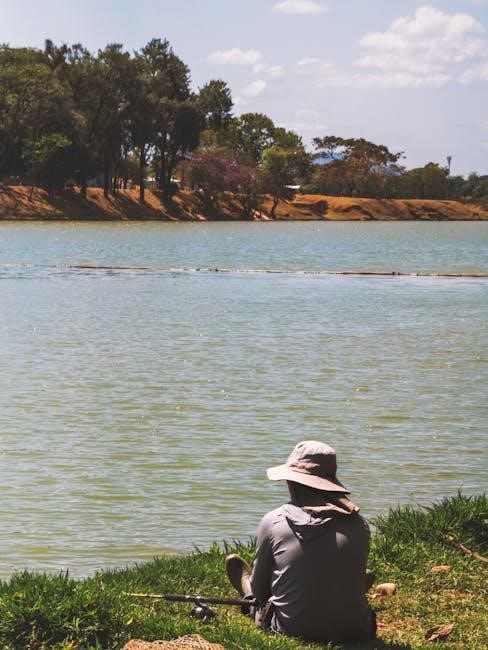Douglas Lake, a scenic Tennessee Valley Authority reservoir in East Tennessee, offers exceptional fishing opportunities. Known for its abundant fish species and stunning Smoky Mountain backdrop, it attracts anglers of all skill levels, providing a perfect blend of recreation and natural beauty.
1.1 Location and Geography
Douglas Lake, located in Sevier County, Tennessee, is a renowned fishing destination. It spans approximately 30,400 acres and is part of the French Broad River system. The lake was created in 1943 by the construction of the Douglas Dam, making it a vital component of the Tennessee Valley Authority (TVA) water management system. Surrounded by the Great Smoky Mountains, the lake offers stunning scenery and diverse ecosystems. Its deep, clear waters and varied structure, including drop-offs, points, and coves, create an ideal habitat for numerous fish species. The lake’s location near Sevierville makes it easily accessible for anglers and tourists alike.
The geography of Douglas Lake supports a wide range of recreational activities, including boating and water sports, in addition to fishing. The TVA manages water levels to balance flood control and recreational use, ensuring optimal conditions for anglers year-round. The lake’s shoreline is dotted with marinas, parks, and public access points, enhancing its appeal as a premier fishing spot in the southeastern United States.
1.2 Why Choose Douglas Lake for Fishing
Douglas Lake is a top-tier fishing destination due to its abundant fish populations and diverse aquatic environments. Its clear waters and varied structure, including deep drop-offs and shallow coves, create ideal conditions for multiple species. Anglers are drawn to the lake’s reputation for producing trophy-sized fish, particularly largemouth and smallmouth bass. The lake’s accessibility, with numerous public access points and marinas, makes it easy for both shore and boat anglers to enjoy. Additionally, the scenic beauty of the surrounding Great Smoky Mountains enhances the overall fishing experience, making Douglas Lake a favorite among outdoor enthusiasts.
The lake’s fishery is well-managed, ensuring sustainable populations and exciting catches year-round. Whether you’re a seasoned angler or a beginner, Douglas Lake offers something for everyone, solidifying its reputation as a premier fishing spot in the southeastern United States.
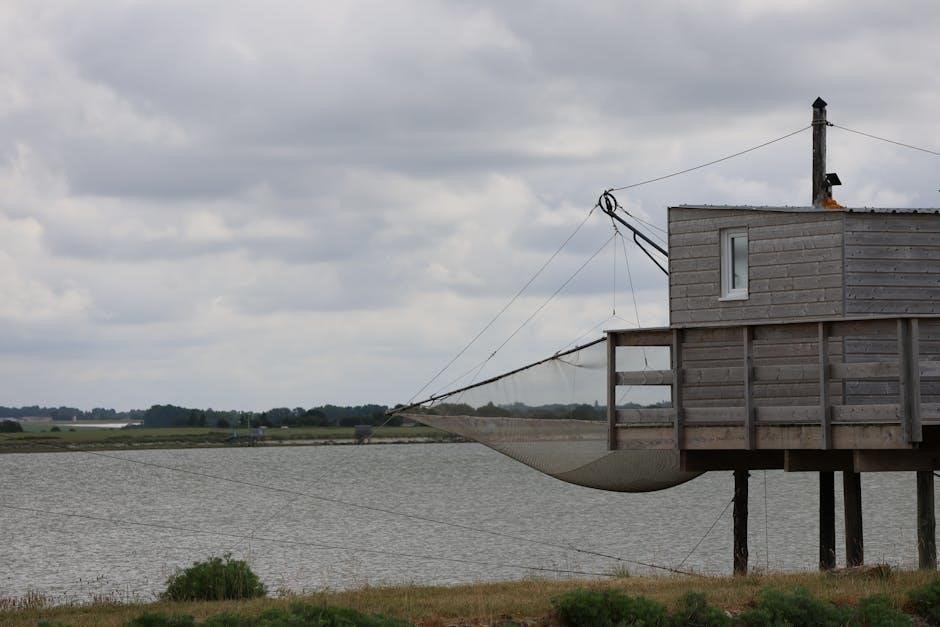
Popular Fish Species in Douglas Lake
Douglas Lake is renowned for its diverse fish populations, including largemouth bass, smallmouth bass, crappie, bluegill, and catfish, offering anglers a wide variety of fishing opportunities.
2.1 Largemouth Bass
Largemouth bass are one of the most sought-after species in Douglas Lake, known for their aggressive behavior and strong fighting ability. The lake’s clear waters and abundant cover provide an ideal habitat for these fish. Anglers often target them near submerged logs, rocky points, and vegetated areas. Spring and fall are prime seasons, with early morning and late evening being the best times to catch them. Popular lures include soft plastics, jigs, and crankbaits. Douglas Lake is renowned for producing trophy-sized largemouth bass, with average catches ranging from 2 to 8 pounds. Conservation efforts ensure a healthy population for future anglers.
2.2 Smallmouth Bass
Smallmouth bass are another prized species in Douglas Lake, admired for their energetic fights and acrobatic leaps. The lake’s rocky structures, gravel beds, and deep drop-offs create perfect conditions for these fish. They tend to thrive in cooler waters, making spring and fall the peak seasons. Anglers often target smallmouth near submerged boulders and sharp depth changes. Effective lures include spinnerbaits, crankbaits, and topwater baits. Douglas Lake is known for its healthy smallmouth population, with average catches weighing between 1 and 5 pounds. Their feisty nature and abundance make them a favorite among both experienced and novice anglers visiting the lake.
2.3 Crappie
Douglas Lake is renowned for its thriving crappie population, attracting anglers seeking both white and black crappie. The lake’s clear waters and abundant submerged structures create ideal habitats for these fish. Crappie in Douglas Lake typically weigh between 1 and 3 pounds, with larger specimens occasionally caught. Spring and fall are peak seasons, as crappie move into shallower areas for spawning and feeding. Anglers target them near submerged trees, rocky drop-offs, and weed beds. Jigs and minnows are highly effective, while light tackle is recommended to avoid spooking these cautious fish. The lake’s crappie fishing offers exciting opportunities for both experienced anglers and newcomers alike.
2.4 Bluegill
Bluegill are abundant in Douglas Lake, offering exciting opportunities for anglers of all skill levels. These panfish typically range from 6 to 10 inches in length and weigh up to 1 pound, making them a great target for families and beginners. Bluegill thrive in the lake’s clear waters, often found near submerged structures, vegetation, or rocky areas. Spring and summer are prime seasons, with fish moving into shallower waters for spawning. Effective methods include using small hooks with live bait like worms or crickets. Light tackle is ideal, and bottom fishing or suspended presentations work well. Their aggressive bites and flavorful meat make bluegill a popular catch.
2.5 Catfish
Catfish are a popular catch in Douglas Lake, known for their strong fighting ability and flavorful meat. Channel catfish and blue catfish are common species here, with sizes ranging from 5 to 20 pounds. They thrive in the lake’s deeper waters, especially near drop-offs, sunken logs, and rocky structures. Nightcrawlers, chicken livers, and stink baits are effective for catching catfish. Summer months offer prime opportunities as they move to shallower areas for feeding. Anglers often use bottom fishing techniques or set lines near submerged structures. Catfish fishing is rewarding, making them a favorite among both experienced anglers and newcomers to Douglas Lake.
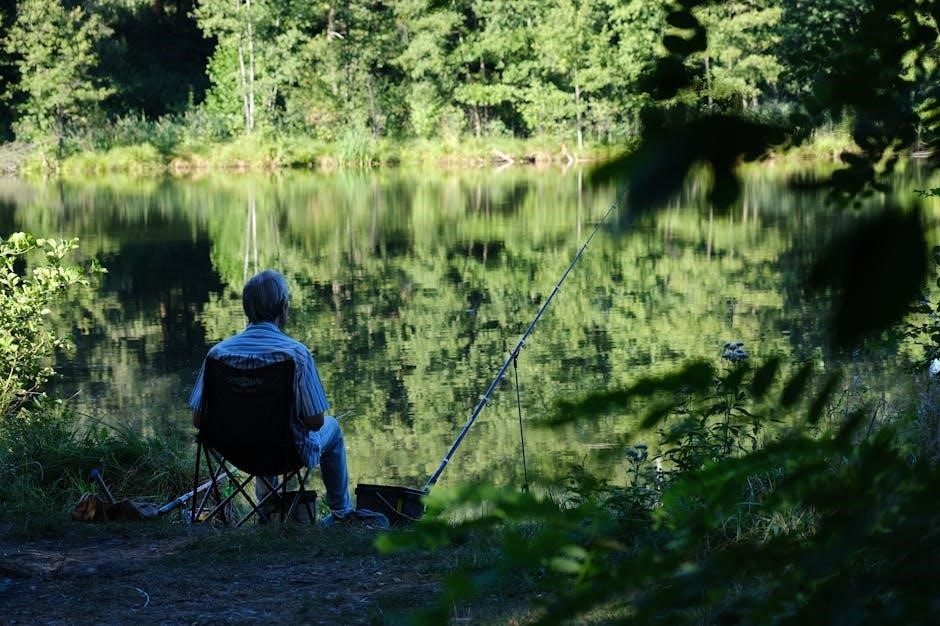
Seasonal Fishing Patterns
Douglas Lake’s fishing patterns change with seasons, as fish behavior adapts to water temperature and weather. Anglers must adjust techniques and locations to match seasonal shifts for success.
3.1 Spring Fishing
Spring fishing on Douglas Lake is highly rewarding as water temperatures rise and fish become more active. Largemouth and Smallmouth Bass move into shallower waters for spawning, making them easier to target. Crappie and Bluegill also thrive during this season, often congregating near submerged structures. Anglers should focus on areas with rocky banks, submerged trees, and shallow coves. Jigs, crankbaits, and soft plastics are effective lures, while live bait like minnows and worms can yield impressive catches. Early morning and late evening are prime times to hook fish. Spring’s changing conditions require adaptability, but the results can be exceptional for dedicated anglers.
3.2 Summer Fishing
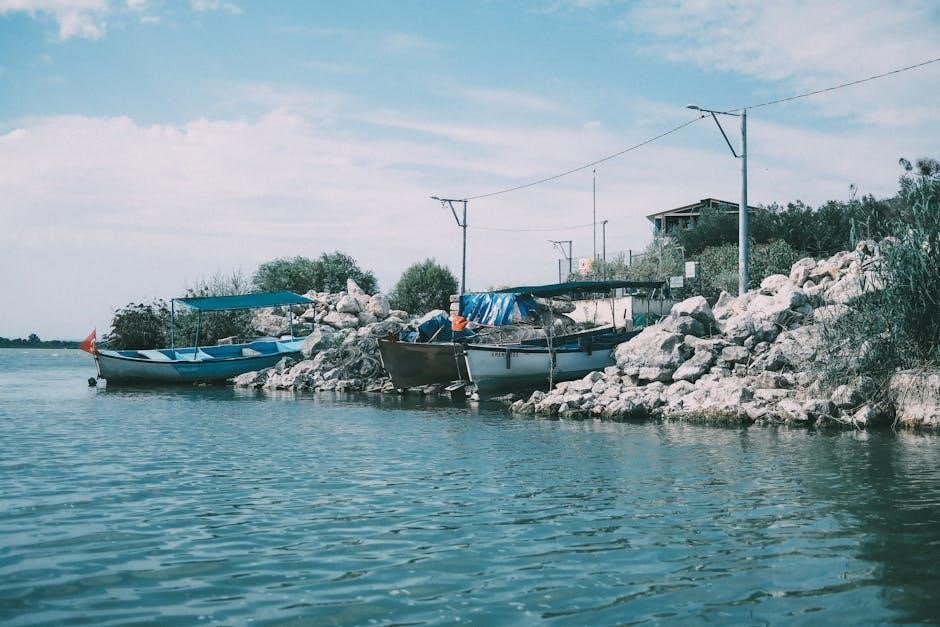
Summer fishing on Douglas Lake offers exciting opportunities as warm weather brings fish to deeper, cooler waters. Largemouth and Smallmouth Bass seek refuge in depths of 10-20 feet, near underwater structures like rocks and drop-offs. Crappie and Bluegill also thrive, often schooling in mid-depth areas. Topwater baits and deep-diving crankbaits are effective for bass, while jigs and minnows work well for crappie. Night fishing can be productive, especially for catfish using stink baits or chicken livers. Summer’s heat demands early morning or evening fishing for optimal results. Stay hydrated and be prepared for varying conditions as fish adjust to seasonal changes.
3.3 Fall Fishing
Fall fishing on Douglas Lake is a prime time to target active fish preparing for winter. As water temperatures cool, species like Largemouth Bass, Smallmouth Bass, and Crappie move to shallower areas, feeding aggressively. Spinnerbaits, crankbaits, and soft plastics are effective for bass, while jigs and minnows work well for crappie. Bluegill and Catfish also remain active, with nightcrawlers and stink baits producing bites. The fall transition often brings schooling fish into coves and creek channels. Early morning and late afternoon are ideal times to fish, as fish are most active during these periods. Fall’s cooler weather makes for pleasant fishing conditions, increasing your chances of a successful trip.
3.4 Winter Fishing
Winter fishing on Douglas Lake offers a unique challenge and opportunity to catch species like Crappie, Catfish, and Bass. As water temperatures drop, fish migrate to deeper, warmer areas, typically 15-30 feet deep. Crappie and Bass can be found near submerged structures, while Catfish remain active in deeper channels. Jigs, spoons, and slow-moving lures are effective, as fish metabolism slows, requiring a more patient approach. Ice fishing is possible when the lake freezes, but check ice safety first. Midday is often best, as sunlight warms the water slightly. Dress warmly and use appropriate gear for cold conditions. Local regulations may apply during winter months.
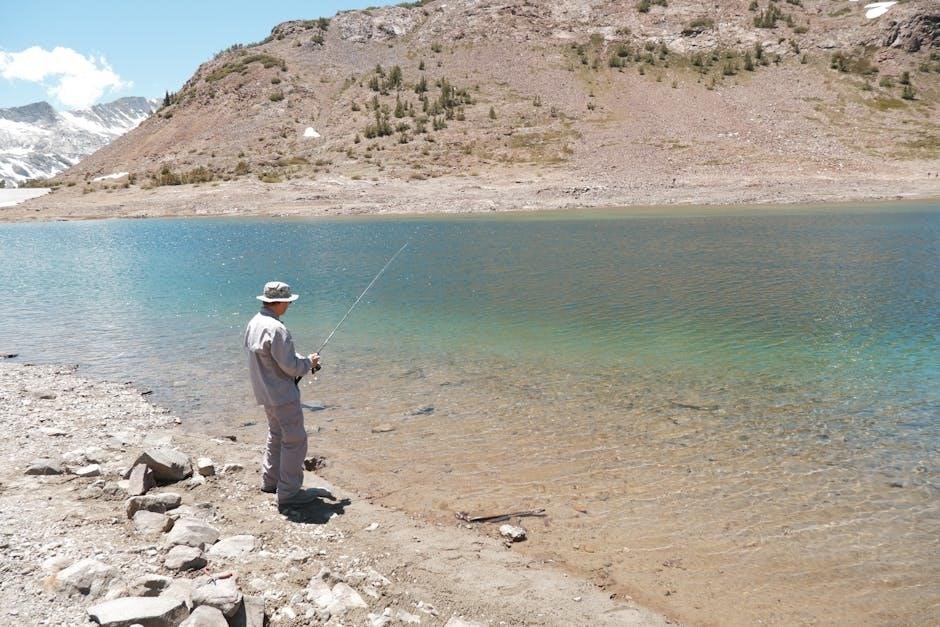
Fishing Techniques for Douglas Lake
Effective techniques include jigging, trolling, and bottom fishing. Use spinnerbaits for Bass and Crappie. Match tackle to target species and adapt to seasonal fish behavior patterns.
4.1 Tackle Recommendations
For Douglas Lake, medium to heavy action rods and reels with sturdy line capacity are ideal. Use monofilament or fluorocarbon lines (10-20 lb test) for clarity and sensitivity. Spinnerbaits, crankbaits, and soft plastic lures work well for Bass. Jigs and minnows are effective for Crappie, while catfish respond to heavy sinkers and strong hooks. Swivels can prevent line twists when using spinners. Hooks should be size 2 to 6, depending on the target species. Live bait like nightcrawlers or minnows is highly recommended. Choose natural colors for clear water and brighter hues for murky conditions. Ensure tackle is durable and adaptable to varying fish behavior and water depths.
4.2 Best Fishing Methods
Douglas Lake offers diverse fishing opportunities, and the best methods vary by species and season. For bass, try using spinners, crankbaits, or soft plastics near submerged structures or weed beds. Crappie respond well to jigs or minnows fished near drop-offs or submerged trees. Catfish are often caught using bottom fishing techniques with nightcrawlers or stink baits. Bluegill can be targeted with small hooks and live bait in shallow waters. Trolling is effective for suspended fish, while casting is ideal for shoreline targets. Seasonal patterns influence fish behavior, so adapt your techniques accordingly. Always consider weather and water conditions to maximize your success on the lake.
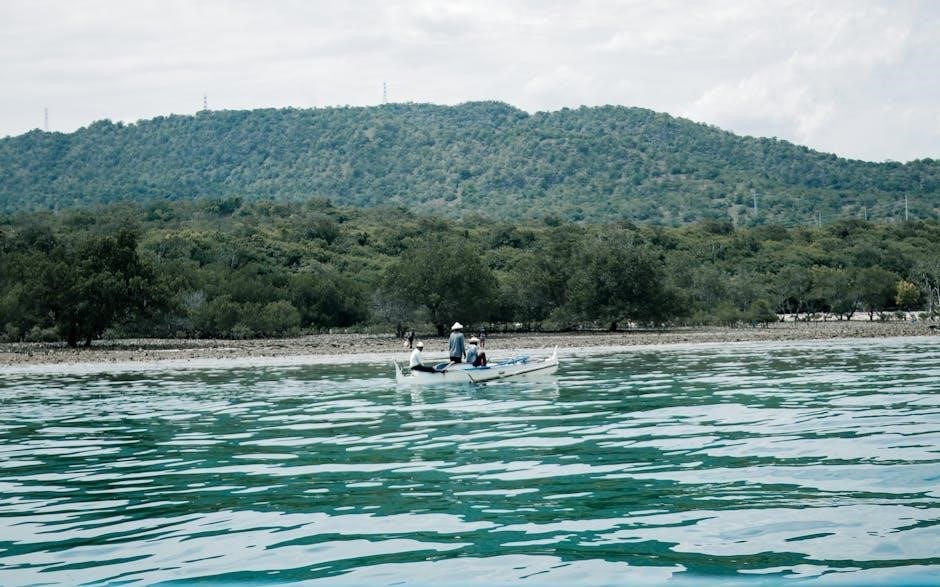
Licensing and Regulations
Fishing on Douglas Lake requires a valid Tennessee fishing license. Regulations include size limits, daily catch limits, and gear restrictions to ensure sustainable fishing practices.
5.1 Fishing License Requirements
Fishing on Douglas Lake requires a valid Tennessee fishing license, as it is located within the state. Licenses are mandatory for all anglers aged 13 and above, with options for both residents and non-residents. Short-term permits are available for visitors, while annual licenses are ideal for frequent anglers. Trout fishing requires an additional stamp. Licenses can be purchased online through the Tennessee Wildlife Resources Agency (TWRA) website, via their mobile app, or at local tackle shops. Ensure compliance with state regulations to support conservation efforts and avoid penalties. Always carry your license while fishing to maintain legal access to Douglas Lake’s abundant fish populations.
5.2 Local Fishing Regulations
Douglas Lake has specific fishing regulations to ensure sustainable fishing practices. Daily catch limits and size restrictions vary by species, with strict rules for largemouth and smallmouth bass, crappie, and catfish. Anglers must adhere to gear restrictions, such as the prohibition of certain net types and limits on hook sizes. Seasonal closures may apply to protect spawning areas. Additionally, some zones may require special permits for activities like trotline fishing. It’s essential to consult the Tennessee Wildlife Resources Agency for the most up-to-date rules before your trip. Following these regulations helps preserve the lake’s fish population for future generations. Always carry a printed copy of the rules.
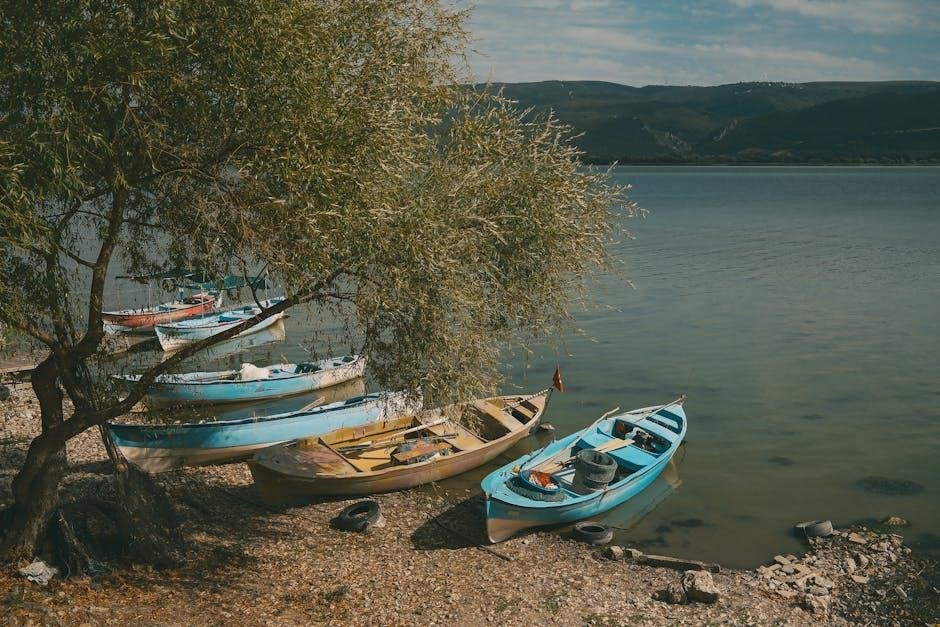
Fishing Guides and Charters
Experienced fishing guides on Douglas Lake offer expert knowledge, ensuring a productive and enjoyable trip. They provide insights into prime fishing spots, techniques, and gear, catering to both beginners and seasoned anglers. Charters often include equipment, making your experience hassle-free and memorable. Guides are well-versed in local conditions, maximizing your chances of a successful catch. Whether you’re targeting bass, crappie, or catfish, their expertise enhances your fishing adventure. Book a guide or charter to make the most of your time on Douglas Lake. Many top-rated guides are locals with years of experience, ensuring a safe and rewarding fishing experience for all skill levels. Choosing a reputable guide service guarantees a well-planned and executed fishing trip tailored to your preferences. Don’t miss the opportunity to explore hidden fishing gems with professional guidance. A guided trip is an excellent way to learn new strategies and enjoy the beauty of Douglas Lake. With their extensive knowledge, guides help you navigate the lake’s diverse ecosystems and seasonal patterns. They also provide safety tips and emergency preparedness, ensuring a secure fishing environment. Guides and charters are a great option for families, corporate events, or solo anglers seeking a personalized fishing experience. Many services offer customizable packages, including half-day or full-day trips. Their expertise in tackle recommendations and best fishing methods ensures you’re well-equipped for success. Booking a guide is a smart choice for anyone looking to make lasting memories on Douglas Lake. The combination of local insight and professional service makes guided trips a standout option for anglers of all levels. Guides are passionate about sharing their love for fishing, creating a fun and educational experience. Their dedication to conservation efforts ensures sustainable fishing practices, preserving the lake’s fish population for future generations. With a focus on habitat preservation, guides promote eco-friendly fishing methods. They also stay updated on local fishing regulations, ensuring compliance and responsible angling. Guides often participate in fish population management programs, contributing to the lake’s ecological balance. By choosing a licensed and reputable guide, you support conservation initiatives while enjoying world-class fishing. Their commitment to safety and environmental stewardship makes them invaluable partners for your fishing adventure. Guides are eager to share their passion for Douglas Lake, offering a unique perspective on its fishing opportunities. Whether you’re a novice or an expert, a guided trip promises an unforgettable experience. Don’t hesitate to book a guide and unlock the full potential of Douglas Lake’s fishing; Their expertise and enthusiasm will leave you with cherished memories and a deeper appreciation for the sport. With a guide, every trip becomes a learning experience, enhancing your fishing skills and knowledge. They are dedicated to providing exceptional service, ensuring your time on the water is both productive and enjoyable. Guides are the key to unlocking the secrets of Douglas Lake’s vibrant fishing scene. Let their expertise guide you to an unforgettable fishing adventure.
6.1 Top-Rated Fishing Guides
Douglas Lake is renowned for its exceptional fishing guides, many of whom are lifelong anglers with deep knowledge of the lake’s ecosystem. These top-rated guides offer expert advice on techniques, bait selection, and prime fishing locations. They specialize in targeting species like largemouth bass, smallmouth bass, and crappie, ensuring a memorable experience for both novice and seasoned anglers. Many guides provide high-quality tackle and gear, while others focus on teaching sustainable fishing practices. With outstanding reviews and a reputation for professionalism, these guides are indispensable for maximizing your fishing success on Douglas Lake. Their expertise guarantees an unforgettable adventure on the water.
6.2 What to Expect from a Guided Trip
A guided fishing trip on Douglas Lake offers an unforgettable experience, tailored to both novice and experienced anglers. Knowledgeable guides provide expert insights into the lake’s best fishing spots, techniques, and seasonal patterns. Expect a day filled with personalized instruction, from choosing the right lures to mastering casting methods. Guides often supply high-quality gear and bait, ensuring you’re well-equipped for success. Many trips include a mix of shoreline and boat fishing, with a focus on targeting species like bass, crappie, and catfish. Safety is a priority, with guides prepared for emergencies and offering tips on navigating the lake. Whether you’re seeking a relaxing day or an adrenaline-packed adventure, a guided trip promises memories and new fishing skills.
Best Fishing Spots on Douglas Lake
Douglas Lake offers diverse fishing spots, including rocky shorelines, submerged humps, and feeder creeks. Anglers favor areas near submerged structures for larger species and shallow coves for panfish. The lake’s pristine conditions and abundant cover make it ideal for both shore and boat fishing, attracting anglers seeking trophy catches and family-friendly fishing experiences.
7.1 Shoreline Fishing Areas
Douglas Lake offers excellent shoreline fishing opportunities, with numerous accessible points perfect for casting a line. The lake’s structure, featuring rocky points, shallow coves, and submerged drop-offs, creates ideal habitats for various fish species. Popular shoreline spots include the dam area, where water movement attracts bass and crappie, and the mouths of creeks like Flat Creek and Horse Creek. Public parks and boat ramps also provide easy access to prime fishing locations. Anglers can cast for largemouth bass in the early morning or target panfish like bluegill and catfish near submerged vegetation. These areas are ideal for both beginners and experienced anglers.
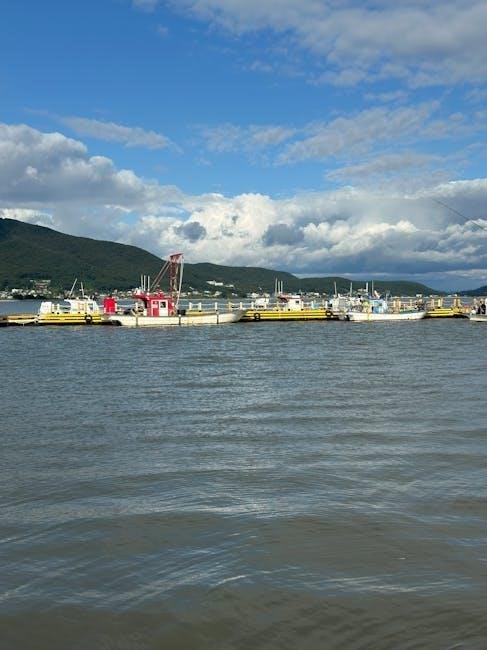
- Rocky points near the dam
- Shallow coves with submerged vegetation
- Creek mouths and channel edges
- Public parks and boat ramps
7.2 Boat Access Fishing Spots
For anglers with a boat, Douglas Lake offers numerous access points and prime fishing locations. Popular boat ramps include the Dandridge Ramp, Swann’s Marina, and the Douglas Dam Ramp. These areas provide easy access to deeper waters and structures like drop-offs, humps, and submerged timber, which attract largemouth and smallmouth bass. Boat anglers often target these structures with crankbaits, jigs, and plastics. Additionally, open-water areas near the main channel can be productive for species like crappie and catfish. Always check local regulations and be mindful of water levels, as they can affect access and fishing success.
- Popular spots include the main lake humps near the dam and submerged creek channels.
Tackle and Gear
For a successful fishing trip on Douglas Lake, bring a variety of tackle and gear suited to your target species. Shore anglers benefit from spin-casting rods, live bait, and bobbers, while boat anglers prefer medium-heavy action rods with crankbaits and plastic worms. Always check local regulations for gear restrictions.
8.1 Essential Gear for Shore Fishing
Shore fishing on Douglas Lake requires the right gear to maximize your experience. Start with a medium to medium-heavy action spinning or baitcasting rod and reel combo, as it offers versatility for various fish species. Use live bait like nightcrawlers, minnows, or crickets, which are effective for species like bass, crappie, and bluegill. Essential tackle includes hooks (sizes 2 to 6), sinkers (split shot or egg sinkers), bobbers, and swivels. A tackle box will help organize your gear. Bring a sturdy fishing line with a minimum of 10-15 lb test, and wear waders or sturdy boots for water access. Don’t forget a stringer or net to land your catch. Polarized sunglasses and a first aid kit are also recommended.
8.2 Recommended Gear for Boat Fishing
When boat fishing on Douglas Lake, it’s essential to have the right gear for a successful experience. A medium to heavy action spinning or baitcasting rod paired with a reel capable of holding at least 150 yards of 10-15 lb test line is ideal. Use high-quality hooks and swivels to prevent line twists. For lures, include crankbaits, jigs, and spinnerbaits in your tackle box. Live bait like minnows or worms can also be effective. Don’t forget a fish finder to locate schools and a GPS for navigating the lake. A first aid kit and life jackets are must-haves for safety.
Local Fishing Events and Tournaments
Douglas Lake hosts various fishing events, including the annual Bass Tournament and Crappie Classic, attracting anglers nationwide. These events foster community spirit and promote sustainable fishing practices.
9.1 Annual Fishing Events
Douglas Lake hosts several annual fishing events that attract anglers of all skill levels. The Douglas Lake Spring Fling kicks off the fishing season in March, featuring a bass tournament with cash prizes. In June, the Family Fishing Day offers a fun, beginner-friendly environment with workshops and activities for kids. The Autumn Anglers Challenge in September focuses on crappie and catfish, while the Cold Water Classic in December tests anglers’ skills in colder conditions. These events promote community engagement, conservation awareness, and competitive spirit, making Douglas Lake a hub for fishing enthusiasts throughout the year.
9.2 Competitive Fishing Tournaments
Douglas Lake hosts several competitive fishing tournaments throughout the year, attracting anglers from across the region. These events showcase the lake’s renowned fish populations and offer significant cash prizes. The most popular tournaments focus on species like largemouth bass, smallmouth bass, and crappie, with strict catch-and-release rules to preserve the ecosystem. Anglers compete in individual and team categories, with weigh-ins held at designated boat ramps. Many tournaments are organized by local fishing clubs and organizations, promoting sportsmanship and community engagement. Proceeds often support conservation efforts, ensuring the lake remains a premier fishing destination for future generations. These events highlight Douglas Lake’s fishing excellence and attract both seasoned pros and amateur anglers.
Conservation Efforts
Douglas Lake’s conservation initiatives focus on sustaining fish populations and habitats. Local organizations monitor water quality and enforce catch-and-release practices to protect species like largemouth bass and crappie. Community-driven programs also educate anglers on environmental stewardship, ensuring the lake’s ecosystem remains healthy for future generations.
10.1 Fish Population Management
Douglas Lake’s fish population management is crucial for maintaining a healthy ecosystem and ensuring sustainable fishing. The Tennessee Wildlife Resources Agency (TWRA) conducts regular fish surveys to monitor species abundance and health. Stocking programs are implemented to replenish populations of key species like largemouth bass and crappie. Regulations such as size limits and catch-and-release policies help protect spawning fish and maintain balance. Habitat restoration projects focus on improving water quality and aquatic vegetation, which supports fish reproduction. These efforts ensure that Douglas Lake remains a premier fishing destination while preserving its natural resources for future generations.
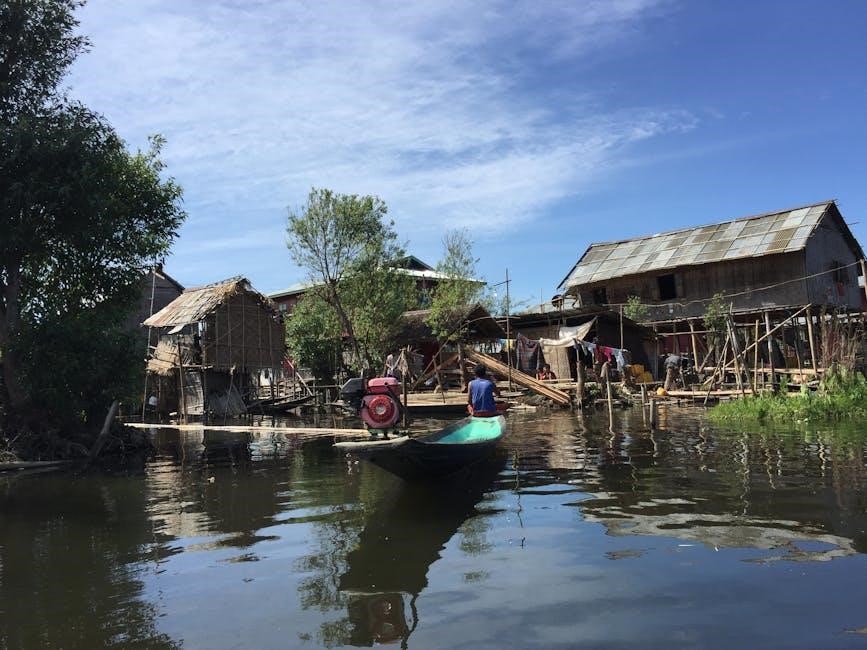
10.2 Habitat Preservation
Douglas Lake’s ecosystem relies on consistent habitat preservation efforts to maintain its thriving fish populations; Key initiatives include protecting shoreline vegetation, which prevents erosion and provides shelter for aquatic species. Local organizations work to reduce pollution by monitoring water quality and implementing measures to prevent agricultural runoff. Artificial reefs and submerged structures are also added to create habitats for fish, enhancing biodiversity. Public education campaigns emphasize the importance of responsible fishing practices, such as avoiding damage to aquatic plants and properly disposing of waste. These efforts ensure a balanced environment, benefiting both fish and the surrounding community.
Safety Tips
Always monitor weather conditions on Douglas Lake, as storms can arise quickly. Carry a first aid kit, phone, and reliable light source for emergencies while fishing.
11.1 Weather Conditions
Douglas Lake’s weather can be unpredictable, especially during fishing trips. Spring and summer often bring sudden thunderstorms, while fall and winter may see cold fronts and strong winds. Always monitor local weather forecasts before heading out on the water. Use tools like NOAA Weather Radio or weather apps to stay informed about changing conditions.
Be prepared for shifting winds and temperature drops, especially in the early morning and late evening. If a storm approaches, seek shelter immediately and avoid open water. Pay attention to changing sky conditions and water chop, as these can signal approaching bad weather.
TIP: Always carry a portable weather radio or smartphone with a weather app to stay updated and ensure a safe fishing experience.
11.2 Emergency Preparedness
When fishing on Douglas Lake, always prioritize emergency preparedness to ensure a safe experience. Carry a well-stocked first aid kit and a cell phone or two-way radio for communication. A flashlight, extra batteries, and a whistle can signal for help if needed. Wear a properly fitted life jacket at all times, and keep a fire extinguisher on board if boating. Familiarize yourself with the lake’s layout and mark navigation channels to avoid shallow areas. Check the weather forecast before heading out and inform someone of your itinerary. Stay prepared for sudden changes in conditions and know the nearest access points for emergencies.
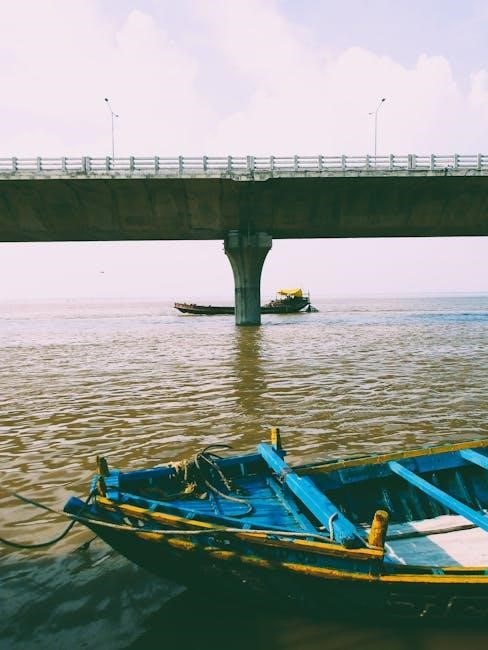
Accommodation Options
Douglas Lake offers various lodging choices, from cozy lakeside cabins to modern resorts and convenient hotels. Campgrounds are also available for outdoor enthusiasts seeking a nature-immersed experience.
12.1 Nearby Lodging
Explore comfortable hotels, bed-and-breakfasts, and vacation rentals near Douglas Lake, perfect for anglers seeking relaxation after a day on the water.
12.2 Camping Facilities
Discover well-equipped campgrounds with amenities like RV hookups, tent sites, and picnic areas, ideal for those who want to stay close to nature and fishing spots.
Douglas Lake offers a variety of lodging options to suit every angler’s needs. From cozy lakeside cabins to modern resorts, there are plenty of choices for a comfortable stay. Many accommodations are located near boat ramps and fishing hotspots, making it easy to plan your day on the water. Some popular options include resorts with marinas, where you can rent boats and store your gear. Additionally, vacation rentals and hotels provide convenient access to dining and shopping. Whether you’re traveling solo or with family, Douglas Lake’s lodging options ensure a relaxing and enjoyable fishing experience.
Douglas Lake offers excellent camping facilities for anglers and outdoor enthusiasts. Many campsites are strategically located near the lake, providing easy access to fishing spots. These facilities range from primitive sites for a more rustic experience to developed campgrounds with amenities like restrooms, potable water, and picnic tables. RV-friendly sites with electric hookups are also available, catering to different camping preferences.
Some campsites are nestled within wooded areas, offering shade and scenic views. Nearby hiking trails and boat launches add to the appeal. Campers can enjoy the peaceful surroundings while being close to prime fishing locations. Booking in advance is recommended, especially during peak seasons.
Douglas Lake is a renowned destination for fishing enthusiasts, offering diverse opportunities to catch various species. Its strategic location and abundant fish populations make it an ideal spot for both beginners and experienced anglers. By understanding seasonal patterns, using the right techniques, and adhering to local regulations, visitors can maximize their fishing success. The lake’s scenic beauty and rich wildlife add to the overall experience. Whether planning a guided trip or a solo adventure, Douglas Lake promises unforgettable memories. Always remember to practice sustainable fishing and respect the environment to preserve this incredible resource for future generations. Start planning your next fishing adventure today!
